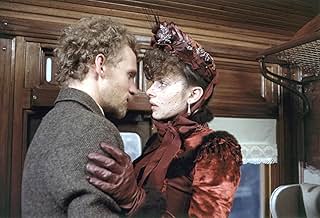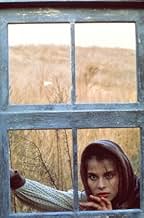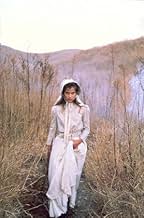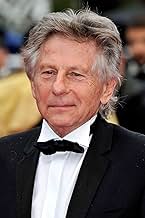Tess
- 1979
- Tous publics
- 2h 50m
IMDb RATING
7.3/10
19K
YOUR RATING
A strong-willed young peasant girl attracts the affection of two men.A strong-willed young peasant girl attracts the affection of two men.A strong-willed young peasant girl attracts the affection of two men.
- Won 3 Oscars
- 16 wins & 17 nominations total
Nastassja Kinski
- Tess
- (as Nastassia Kinski)
Featured reviews
This film was an almost exact replication of Thomas Hardy's novel "Tess of the d'Urbervilles". It's so rare to watch a film after reading the novel and not be disappointed by it, but this film didn't disappoint in any way.
Details, such as the whiteness of the maids' dresses, the sound of milk squirting into a bucket, the sloshing mud of a wet English turnip field, and the glint of adoration in the eyes of the young lovers -- all came gloriously to life as if fresh off the pages of the book.
I highly recommend this film for anyone who enjoys a good old fashioned Victorian love story.
Details, such as the whiteness of the maids' dresses, the sound of milk squirting into a bucket, the sloshing mud of a wet English turnip field, and the glint of adoration in the eyes of the young lovers -- all came gloriously to life as if fresh off the pages of the book.
I highly recommend this film for anyone who enjoys a good old fashioned Victorian love story.
I don't know what's been keeping them but 'Tess' has been overdue for a DVD release for a very long time. At last it's here, and it looks gorgeous, although it hasn't been digitally cleaned up and there are a couple of scratches here and there. It's been worth the wait though, as this is possibly the most beautifully photographed film ever made.
Ever since the release of '2001: A Space Odyssey' I have been fascinated by the work of Stanley Kubrick and his cinematographer on that film, Geoffrey Unsworth. 'Tess' was Unsworth's last work; he died during the filming, and shared his Oscar for this with Ghislain Cloquet, who finished shooting, copying Unsworth's own style. The lighting is subtle and appears beautifully natural: just look at the first five minutes starting with village club dancers walking to the field, John Durbeyfield's fateful meeting with the parson, the arrival of Tess' future husband Angel Clare, with the late summer afternoon shading gradually into evening and darkness and all before we have even identified which girl is Tess. Oh, and that stunning moment when Tess finds her confessional letter to Angel has slipped under the carpet of his room unread, and her stunned realisation is underlined by the wheeling camera shot and the blinding flaring of the sun behind her head suddenly wiping all else off the screen for a moment. Wonderful.
Do yourself a favour and look up Geoffrey Unsworth on the internet movie database the number, quality and range of films he contributed to is astonishing. By all accounts he was a lovely man too, the featurettes underline the terrific camaraderie that existed on the shoot between all the cast and crew, and it is really moving to hear their tributes and memories of Unsworth, particularly Nastassia Kinski fighting back tears as she recalls his death.
In the film, of course, Kinski is absolutely wonderful, just perfect for the role of tragic victim Tess, the 'pure woman' of Hardy's subtitle. Despite comments to the contrary I find her accent quite a commendable attempt at Dorset, having lived and worked there myself, and my wife having been born there. Some of the other accents are generalised country yokel, but Kinski has learned a pretty authentic representation of Dorset's rolling rounded vowels.
I'm also a Hardy fan, and Tess is quite possibly my favourite novel. I remain astonished that Polanski was so successful in transferring it to the screen. The featurettes make it clear the main task of literary adaptation for the screen is cutting things out, yet when I first saw the film I couldn't think of a thing that was missing. That's impossible of course, but the choice of what to film and what to leave out is almost seamless. Perhaps the only serious omission is the passage in the book where Tess feels guilt for inadvertently causing the death of the family horse in a night-time collision with the post-cart, and it is to assuage this guilt that she agrees to visit 'cousin' Alec, which is of course her great undoing. Polanski tried to cut the film to meet the expectations of distributors (and Francis Ford Coppola!) but some idea of his reluctance comes from the disclosure that he took 3 months to cut 20 minutes. I'd love to see a director's cut with that footage restored.
Finally, the background material reveals the bone-headiness of some of those involved in film distribution. The co-producer shows the film to the buyers of the two main IK distributors, and (pre-Oscars) one of them says 'This film will only show in my cinemas over my dead body.' Doesn't that remind you of Decca turning down The Beatles?
Ever since the release of '2001: A Space Odyssey' I have been fascinated by the work of Stanley Kubrick and his cinematographer on that film, Geoffrey Unsworth. 'Tess' was Unsworth's last work; he died during the filming, and shared his Oscar for this with Ghislain Cloquet, who finished shooting, copying Unsworth's own style. The lighting is subtle and appears beautifully natural: just look at the first five minutes starting with village club dancers walking to the field, John Durbeyfield's fateful meeting with the parson, the arrival of Tess' future husband Angel Clare, with the late summer afternoon shading gradually into evening and darkness and all before we have even identified which girl is Tess. Oh, and that stunning moment when Tess finds her confessional letter to Angel has slipped under the carpet of his room unread, and her stunned realisation is underlined by the wheeling camera shot and the blinding flaring of the sun behind her head suddenly wiping all else off the screen for a moment. Wonderful.
Do yourself a favour and look up Geoffrey Unsworth on the internet movie database the number, quality and range of films he contributed to is astonishing. By all accounts he was a lovely man too, the featurettes underline the terrific camaraderie that existed on the shoot between all the cast and crew, and it is really moving to hear their tributes and memories of Unsworth, particularly Nastassia Kinski fighting back tears as she recalls his death.
In the film, of course, Kinski is absolutely wonderful, just perfect for the role of tragic victim Tess, the 'pure woman' of Hardy's subtitle. Despite comments to the contrary I find her accent quite a commendable attempt at Dorset, having lived and worked there myself, and my wife having been born there. Some of the other accents are generalised country yokel, but Kinski has learned a pretty authentic representation of Dorset's rolling rounded vowels.
I'm also a Hardy fan, and Tess is quite possibly my favourite novel. I remain astonished that Polanski was so successful in transferring it to the screen. The featurettes make it clear the main task of literary adaptation for the screen is cutting things out, yet when I first saw the film I couldn't think of a thing that was missing. That's impossible of course, but the choice of what to film and what to leave out is almost seamless. Perhaps the only serious omission is the passage in the book where Tess feels guilt for inadvertently causing the death of the family horse in a night-time collision with the post-cart, and it is to assuage this guilt that she agrees to visit 'cousin' Alec, which is of course her great undoing. Polanski tried to cut the film to meet the expectations of distributors (and Francis Ford Coppola!) but some idea of his reluctance comes from the disclosure that he took 3 months to cut 20 minutes. I'd love to see a director's cut with that footage restored.
Finally, the background material reveals the bone-headiness of some of those involved in film distribution. The co-producer shows the film to the buyers of the two main IK distributors, and (pre-Oscars) one of them says 'This film will only show in my cinemas over my dead body.' Doesn't that remind you of Decca turning down The Beatles?
Roman Polanksi's Tess gets better and better with age.
The mists...the sounds of footsteps on the dirt roads... the ambling horse... the elflike man that appears at the Cross in Hands, Tess' walk to her Inlaws church, The dripping water, The taking of the boots, the misplaced letter, the milk run, the puddle in the road, the dripping milk pouches, The strawberry, the blood stain, The burial, Stonehenge...Everything is beautifully shot. It lingers in the mind long after viewing. Geoffrey Unsworth's final cinematographic film. Thank you for all your beautiful work.
It is neither pretentious nor bold.
Mesmerizing! The musical composition is charging.
Nastassja Kinski's plays the title character. She reacts so well. Her beauty in a time of such oppression and depression would be an ill fate. Tess knows this fate and she wishes she was never born. She is the sacrifice of a paradigm. Victorian era was finished. Edwardian Enlightenment would soon come but not for Tess, the sacrificial pure beauty.
Thomas Hardy created a pure woman in Tess. That is why her plight is so tragic. She possesses a strong spirit that is oppressed by the male political and religious world around her.
The opening shot is well directed in the morning sunrise as fair maidens dance with one another. Tess' oversight by Angel begins this tragic tale. "As Flies to wanton boys, are we to the Gods, they kill us for their sport."
Tess, Thomas Hardy
Do not take your eyes off of it. It is beautifully told!
Victor Nunnally, BFA Dramatic and Film Theory and History, AA Performing Experience.
The mists...the sounds of footsteps on the dirt roads... the ambling horse... the elflike man that appears at the Cross in Hands, Tess' walk to her Inlaws church, The dripping water, The taking of the boots, the misplaced letter, the milk run, the puddle in the road, the dripping milk pouches, The strawberry, the blood stain, The burial, Stonehenge...Everything is beautifully shot. It lingers in the mind long after viewing. Geoffrey Unsworth's final cinematographic film. Thank you for all your beautiful work.
It is neither pretentious nor bold.
Mesmerizing! The musical composition is charging.
Nastassja Kinski's plays the title character. She reacts so well. Her beauty in a time of such oppression and depression would be an ill fate. Tess knows this fate and she wishes she was never born. She is the sacrifice of a paradigm. Victorian era was finished. Edwardian Enlightenment would soon come but not for Tess, the sacrificial pure beauty.
Thomas Hardy created a pure woman in Tess. That is why her plight is so tragic. She possesses a strong spirit that is oppressed by the male political and religious world around her.
The opening shot is well directed in the morning sunrise as fair maidens dance with one another. Tess' oversight by Angel begins this tragic tale. "As Flies to wanton boys, are we to the Gods, they kill us for their sport."
Tess, Thomas Hardy
Do not take your eyes off of it. It is beautifully told!
Victor Nunnally, BFA Dramatic and Film Theory and History, AA Performing Experience.
In this adaptation of the Hardy novel, a peasant girl who may be descended from a noble family encounters romance and tragedy in 19th century England. Meticulously directed by Polanski, this epic drama unfolds quite leisurely but does not drag. The English countryside is beautifully captured, with the cinematography adding a haunting quality to the barren landscape, an effect further enhanced by the evocative score. Perhaps she does not faithfully embody the strong-willed heroine of the novel, but Kinski (resembling a young Ingrid Bergman) looks exquisite and effectively conveys a sense of melancholy in a star-making performance.
Tess had a lot going for it, a wonderful book and a director that was responsible for masterpieces like Chinatown, Repulsion and Rosemary's Baby. Tess didn't quite live up to the promising potential it did have and I don't consider it one of Polanski's masterpieces. However it is a commendable film and adaptation(even if I do prefer the 2008 BBC series) and better on re-watch than when I saw it a couple of years back and didn't care at all for it. The film is overlong, and while the pace is purposeful considering the book's complexity there are times where it does get a bit too languid. On the other hand, visually it is stunning with evocative scenery and photography. The music is also resolutely haunting, the scripting thought-provoking and literate and the story having its necessary pathos as well as being devastating and powerful in equal measure. The denouncement with Stonehenge as the backdrop is just stunning. The characters are not as complex as in the book or the series but are still interesting and emphatic. Nastassja Kinski does have moments where she is a little flat, but on the whole it is a very moving performance. Peter Firth is suitably subtle as Angel Clare and Leigh Lawson's menacing Alec comes close to stealing the film. Polanski's direction is exemplary. All in all, has much to admire but falls flat of being a truly outstanding movie. 7/10 Bethany Cox
Did you know
- TriviaThe film's opening dedication at the start of the film states: "For Sharon". Roman Polanski dedicated this movie to his late wife, Sharon Tate, who was killed in 1969 by the Manson Clan. Before Tate's death, she had read the film's source novel by Thomas Hardy and was convinced that her husband would one day make a great film based on the novel, with the hope that she would star in it. Movie was released to the theaters exactly 10 years after her untimely death.
- GoofsAt the beginning of the final sequence, set at Stonehenge, someone's head can be seen at bottom-left.
- Alternate versionsThe film was first released to German cinemas uncut with a running time of 184 minutes. As the audience reaction was far from overwhelming the distributor decided to re-cut and re-release the film in a more "accessible" 134 minutes version. But at least one of the original prints had survived and was shown here at the local art house years later.
- ConnectionsFeatured in The 38th Annual Golden Globe Awards (1981)
- How long is Tess?Powered by Alexa
Details
Box office
- Budget
- $12,000,000 (estimated)
- Gross US & Canada
- $20,093,330
- Gross worldwide
- $20,101,247
- Runtime
- 2h 50m(170 min)
- Color
- Aspect ratio
- 2.35 : 1
Contribute to this page
Suggest an edit or add missing content


























